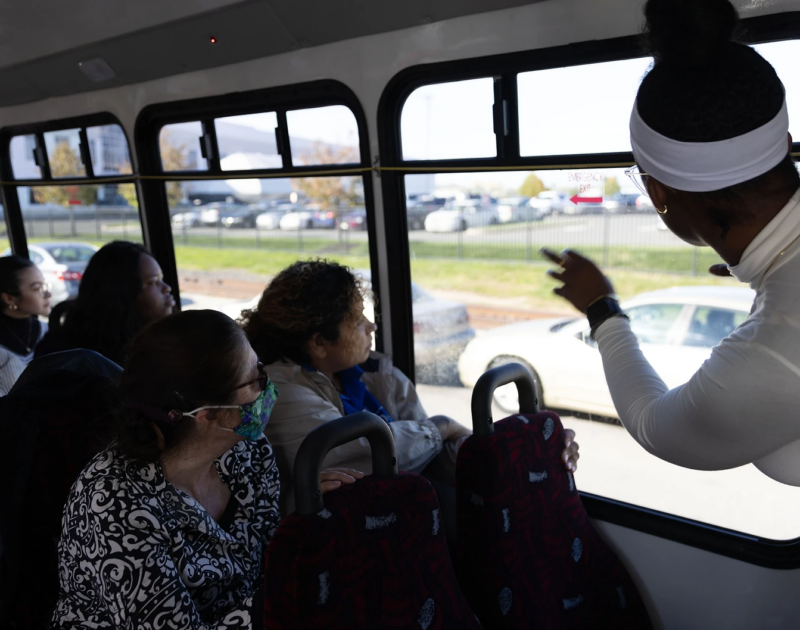
By connecting your course to a HAL project, you’ll give your undergraduate or graduate students hands-on experience collaborating with communities, exchanging with peers in campuses across the country, and creating a multi-media public history project that will engage audiences internationally.
Using HAL curricular resources with support from HAL Hub staff, students and community partners will co-create a local “chapter” of one of HAL’s collective projects, sharing your community’s history and experiences with the issues these projects address, like mass incarceration, climate justice, or university-driven displacement from urban renewal.
You can also share ways your community is implicated in or impacted by sites HAL projects focus on, such as the US Naval Base at Guantánamo Bay or the Rikers Island Jails. Your class will have the opportunity to work in concert with our national coalition of 1,000+ students, educators, and community partners who are confronting our pasts, together, to imagine a more just future.
- Connecting your students with communities beyond your institution, both locally and nationally.
- Hands-on experience collaborating with community members and organizations, and co-creating multi-media stories.
- Opportunity for your students’ and community partners’ work to engage public audiences in dozens of cities, through a traveling exhibit and website.
- Applying your skills and assets to support communities around the country.
- Curricula and other resources for project-based learning, as desired, from bibliographies to virtual workshops to a week-by-week curation work plan
- Frameworks for collaborating with community organizers
- Support with creating project and exhibit media, including how-to guides, template design files, and formats for both physical and digital exhibits
- An existing, professionally produced platform for student projects and stories
- Facilitated exchanges with other student-community teams across the country
- For educators whose students are majority from frontline/directly impacted communities: Funds to support faculty time, student support, and media production
- You’ll offer a course through which students collaborate with local organizations outside of your college/university, representing frontline communities who are directly impacted by the issues of the project you’re connecting with, such as environmental/climate justice, the criminal legal system, or university-driven urban renewal. Collaborations can take a variety of forms, provided they adhere to HAL’s values; HAL can provide partnership guidelines for ideas and support.
- With partner organizations, your class will co-create a local story, to be connected with those from other communities across the world through one of HAL’s collective projects (e.g., Climates of Inequality or States of Incarceration). Local stories explore co-creators’ local histories and experiences through oral testimony, short films, infographics, storymaps, or other modes.
- The HAL Hub will provide a design and content framework for your media to fit into. In this way, your local story can be integrated into one of HAL’s collective projects. As desired, HAL can provide you with resources such as exhibit media formats and a step-by-step process designed to fit within a 12-14 week semester.
- Outside of your locality, you’ll be working in concert with other student-community teams across the country. Along the way, the HAL Hub will facilitate opportunities for your students to engage with peers on other campuses around shared issues and works-in-progress, through synchronous and asynchronous exchanges.
- You’ll also have the opportunity to participate in HAL’s virtual and in-person convenings to share and collaborate with other partners in our coalition. Travel funds and stipends available for community partners and faculty working with majority frontline/directly impacted students.
- As a university or college educator, you already have or can develop a course or another mechanism to work with a group of students. There is no need to create anything new if you have an existing structure through which you can do this work. Please note that the HAL Hub does not have the capacity to work directly with individual students; we liaise with faculty or community leaders who are coordinating a group of students.
- You have an existing partnership with a local organization representing people directly impacted by the history you’re exploring, or you have an agreement with one to partner with you.
- Among your group of students or among your proposed community collaborators, the majority of your active voices are individuals who have been directly impacted by environmental/climate injustice, the criminal legal system, or urban renewal, depending on the project on which you are working.
- You’re committed to being an active participant in the HAL coalition as a learner and teacher, attending 3-4 virtual planning meetings and discussions per year, and (pending funding) one in-person convening.
